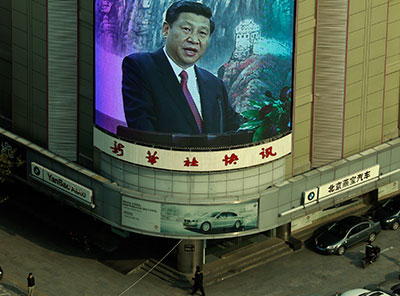Like many China watchers, we at CPJ have been struggling to interpret obscure floor markings and tie colors on display in Beijing as new Communist Party leaders were appointed in a rare leadership hand-off today. The names of the top seven are no longer in doubt. But the real question everyone’s asking is: What does it mean (for press freedom)?
If you’re not sure of the answer, you’re not alone. Sure, we know that Xi Jinping, Li Keqiang, Zhang Dejiang, Yu Zhengshen, Liu Yunshan, Wang Qishan, and Zhang Gaoli are the political winners. We can even point to their ideological backgrounds and conclude that they are among the older, more conservative candidates from the pool of potential appointees, as many international news reports and analysts have done. But we don’t know much more, and the implications for media strategy are still murky.
Change of some kind is underway. The committee traditionally had seven members, which rose to nine in 2002, and has now been capped at seven once again. Why? Either because seven is more streamlined, or because it represents a chance to push two unpopular departments further from the seat of power, or both, the reports say. So two portfolios, while still influential, will not likely be invited to the standing committee meetings going forward.
But which two isn’t certain. Analysts like the Jamestown Foundation’s Willy Lam and the Brookings Institute’s Cheng Li agree that the ones most likely to get the axe are ideology–which includes propaganda and censorship–and security, which controls police and the courts under a Central Political-Legal Commission. That ballooned to inefficient proportions under Zhou Yongkang, who lost a lot of political clout during the downfall of his ally, Bo Xilai, earlier this year. CPJ would certainly welcome an apparent rebuke to two notoriously conservative party organs which have consistently obstructed domestic media and Internet activists.
Yet Melanie Hart of the DC-based Center for American Progress warns that it’s too soon to say if or how this demotion will take place. Observers must watch appointments to significant groups and commissions within the party over the next few months–and high-level committee members could potentially double-up on key assignments, she told CPJ by telephone today.
What’s more, even if propaganda and security are sent to the bench, a reversal of China’s policy of information control is hardly likely. One appointee, Liu Yunshan, ranked fifth in the new order, is current head of the propaganda department, and has made his name as a strict information manager. The exclusion of a role held by Zhou Yongkang could be a message for Zhou and his supporters, rather than an indication of policy. The propaganda and security roles were late additions to the leadership roster just a decade ago, so a reversion to the original seven may be a traditional, rather than a reformist move. Finally, as we pointed out on Tuesday, nudging influential leadership positions into the back seat is not the same as dismantling them.
All told, the prospect for reform is bleak. Perhaps the best news today is that it’s no bleaker than it has been. As Hart emphasized, outgoing leaders Hu and Wen talked a lot about reform, and raised expectations both in and outside China that they were either unwilling or unable to meet–so optimism now, if there were any, could be just as misplaced. And there’s always next time. Xi Jinping and Li Keqiang, who will replace Hu Jintao and Wen Jiabao respectively when legislative appointments are finalized in March 2013, are the only committee members young enough to serve a full decade in power–clearing the way for new appointments in five years’ time.
